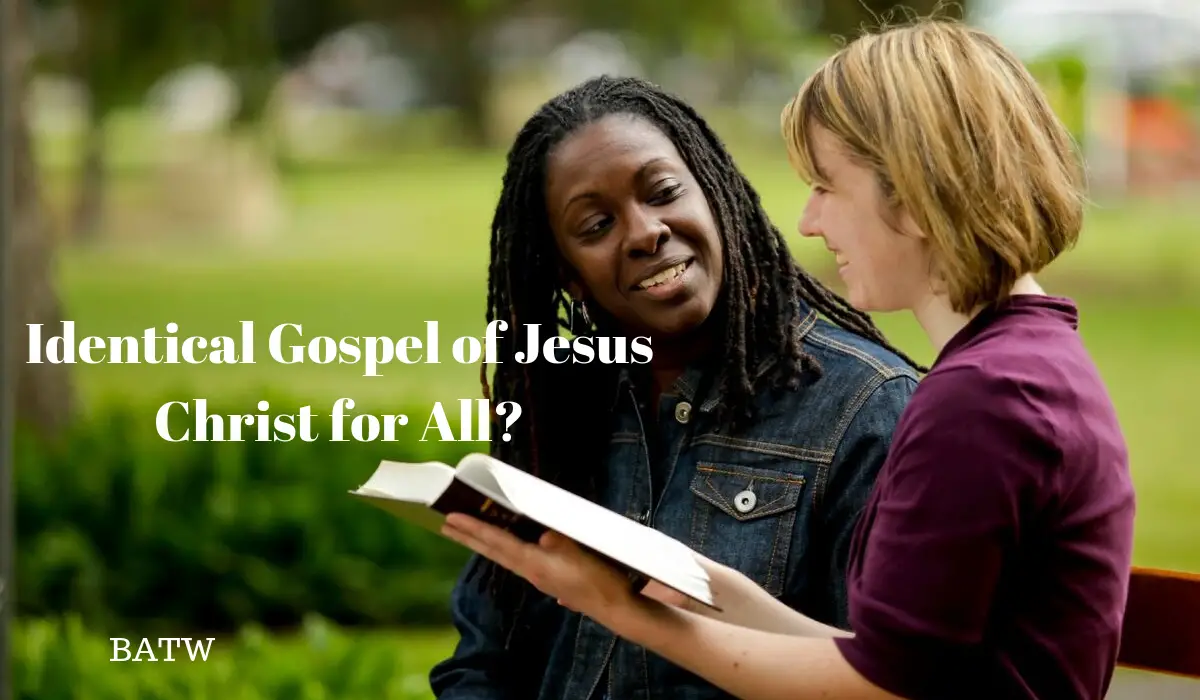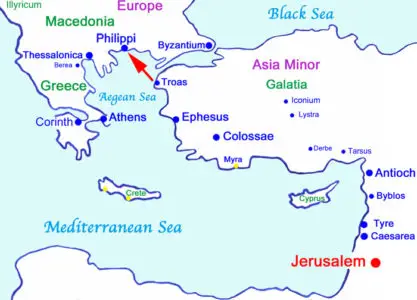The Same Gospel of Jesus Christ to Both Jews and Gentiles
Apostle Paul and his traveling companions, having established in Caesarea that he was ready both to be arrested and to die for the name Jesus Christ, continued on his third missionary journey to Jerusalem.
In Jerusalem, we will learn that although both the Jews and the Gentiles heard the identical gospel of Jesus Christ, yet they have different spiritual obligations and expectations.
Through Paul’s meeting with the “Elders”, in Jerusalem, we learn that the Jews who believed the Gospel of Jesus Christ are still expected to circumcise their male children and to keep the “customs”.
On the other hand, we are also informed that the Gentiles who believed the identical gospel of Christ as the Jews have no such responsibility or obligation.
But why is this so, and why is this important to them and to contemporary Christians?
The Will of God be Done
“And when [Paul] would not be persuaded, we ceased, saying, The will of the Lord be done” (Acts 21:14).
The brethren, seeing Paul’s determination to go up to Jerusalem, resolved that this was the will of God.
“And after those days we took up our carriages and went up to Jerusalem” (Acts 21:15).
As a result, they resumed their journey to Jerusalem, but Mnason of Cyprus had joined them and he was their new host.
“There went with us also certain of the disciples of Caesarea, and brought with them one Mnason of Cyprus, an old disciple, with whom we should lodge” (Acts 21:16).
The Disciples Arrive in Jerusalem
“And when we [came] to Jerusalem, the brethren received us gladly” (Acts 21:17).
So, they arrived at Jerusalem and the Church that was there received them cheerfully with open arms.
But the next day, Paul and the other disciples with him had a meeting with the church leaders.
“And the day following Paul went in with us unto James; and all the elders were present” (Acts 21:18).
During Paul’s meeting with the church leaders, he made a definite reference to the miracles that God had done by him amongst the Gentiles.
“And when he had saluted them, he declared particularly what things God had wrought among the Gentiles by his ministry” (Acts 21:19).
Paul Preached The Same Gospel of Jesus Christ to Both Jews and Gentiles
Therefore, Apostle Paul recounted some of the incidents that happened along the way.
Consequently, he may have told them about the Bereans, The Thessalonians, those at Ephesus and Miletus, but I don’t think he narrated all that transpired in every city that he visited.
That exposition would be a very long one and it would require more that one meeting to expound on all his experiences on his third missionary journey.
“And when they heard it, they glorified the Lord, and said unto him, Thou seest, brother, how many thousands of Jews there are which believe; and they are all zealous of the law” (Acts 21:20).
Rumors Them Spreading
“And they are informed of thee, that thou teachest all the Jews which are among the Gentiles to forsake Moses, saying that they ought not to circumcise their children, neither to walk after the customs” (Acts 21:21).
Did Apostle Paul teach those Christian-Jews this? No, he didn’t but the unbelieving Jews of Asia were spreading rumors amongst the brethren that he did. Rumors them spreading.
“What is it therefore, the multitude must needs come together: for they will hear that thou art come” (Acts 21:22)?
Now, seeing that everybody will hear of Paul’s return to Jerusalem, the Elders proposed to him a bold and Jewish plan to dispel the doubts of the Christian-Jews in Jerusalem.
“Do therefore this that we say to thee: We have four men which have a vow on them” (Acts 21:23).
The Symbolism of a Vow
When a Jewish person makes a “vow” or an oath to God he does two primary things. First, he separates him or herself to the vow, then he or she satisfies or pays the vow, (Numbers 30:2).
Note the importance of the “temple” in the presentation of the vow. The former is the place where the latter is paid or presented to God.
And for that reason, later, Paul will enter into the temple, (Acts 21:26).
Therefore, the Elders continue to explain their plan to Paul:
“Them take, and purify thyself with them, and be at charges with them, that they may shave their heads: and all may know that those things, whereof they were informed concerning thee, are nothing; but that thou thyself also walkest orderly, and keepest the law” (Acts 21:24).
Additionally, observe the motive behind the Elders’ request. They desire to demonstrate to the Christian-Jews that what they were “informed” concerning Paul and the Law is false and that he keeps the Law.
In other words, “all may know that those things, whereof they were informed concerning thee, are nothing” (Acts 21:24).
Circumcision is Not Optional
But concerning the Gentile-Believers, the Elders concluded that they should neither circumcise their male children nor keep the law.
“As touching the Gentiles which believe, we have written and concluded that they observe no such thing, save only that they keep themselves from things offered to idols, and from blood, and from strangled, and from fornication” (Acts 21:25).
To the Jews, circumcision is not optional. And the advent of Jesus Christ didn’t remove it (Genesis 17:9-13).
But it’s a perpetual covenant between them and the Lord through all their generations (Genesis 17:7).
Paul couldn’t have taught against it because he was circumcised. And moreover, he believed the Scriptures concerning its never-ending practice amongst the Jews.
But the Lord never made the identical agreement with any Gentile nation or nations.
“Then Paul took the men, and the next day purifying himself with them entered into the temple, to signify the accomplishment of the days of purification, until that an offering should be offered for every one of them” (Acts 21:26).
The Preaching of the Gospel of Jesus Christ Does not Cancel These
There are many natural and spiritual covenants and actions that the Lord God gave only to the Jews.
The circumcision of every male child on the eighth day, the keeping of the Sabbath and the Passover are but a few of them.
Nevertheless, the preaching of the Gospel of Jesus Christ doesn’t cancel or prevent them.
But Gentiles Believers should only adopt those covenants that have spiritual applications to them.
The wholesale adoption of all causes confusion and demonstrates a pervasive ignorance of the Word of God.
Finally, one of our primary responsibilities is to worship and serve the Lord God according to a heavenly knowledge of His Word, not according to the knowledge of the earth or of the wisdom of man, but of God (Romans 10:3).



